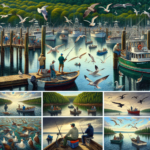Fishing in Massachusetts: Coastal and Inland Spots

Introduction
Did you know that Massachusetts boasts over 1,500 miles of coastline and countless inland lakes and rivers, making it a prime destination for fishing enthusiasts? Whether you’re a seasoned angler or a novice looking to cast your first line, Massachusetts offers a diverse range of fishing opportunities. This article will guide you through the best coastal and inland fishing spots in the state, the techniques to use, the species you can expect to catch, and much more.
Fishing in Massachusetts is not just a pastime; it’s a way to connect with nature, enjoy the great outdoors, and even contribute to conservation efforts. Whether you’re interested in saltwater fishing along the Atlantic coast or freshwater fishing in the state’s numerous lakes and rivers, this guide will provide you with all the information you need to make the most of your fishing adventures.
Background/Context
Historical or Cultural Significance
Fishing has been an integral part of Massachusetts’ history and culture for centuries. The state’s coastal waters were once teeming with cod, leading to the nickname “The Codfish State.” Fishing has played a crucial role in the local economy and continues to be a popular recreational activity. The state’s rich maritime history is evident in its many fishing villages, historic lighthouses, and maritime museums.
Geographical Overview
Massachusetts is located in the northeastern United States, bordered by the Atlantic Ocean to the east. The state’s coastline features a mix of sandy beaches, rocky shores, and estuaries, providing diverse habitats for various fish species. Inland, Massachusetts is home to numerous lakes, rivers, and reservoirs, each offering unique fishing opportunities. The state’s climate varies from cold winters to warm summers, affecting fishing conditions and species availability throughout the year.
Key Points/Details
Fishing Techniques
Technique Overview
Massachusetts offers a variety of fishing techniques, including fly fishing, surfcasting, trolling, and ice fishing. Each technique is suited to different environments and species.
When and Where to Use
Fly fishing is popular in the state’s rivers and streams, particularly for trout and salmon. Surfcasting is ideal for coastal areas, targeting species like striped bass and bluefish. Trolling is effective in larger lakes and reservoirs for catching species such as lake trout and landlocked salmon. Ice fishing is a winter activity, commonly practiced on frozen lakes and ponds.
Recommended Gear
- Fly Fishing: Fly rod, reel, fly line, and a variety of flies.
- Surfcasting: Long surf rod, spinning reel, heavy-duty line, and lures or bait.
- Trolling: Trolling rod, reel, downriggers, and trolling lures.
- Ice Fishing: Ice auger, ice fishing rod, tip-ups, and live bait or jigs.
Species Information
Species Overview
Massachusetts waters are home to a wide range of fish species. In coastal areas, you can find striped bass, bluefish, flounder, and mackerel. Inland waters are populated with trout, bass, pike, and perch.
Best Practices
For striped bass, use live bait or lures that mimic their natural prey. Trout fishing is best with flies or small spinners. Bass can be caught using plastic worms, crankbaits, or topwater lures. Pike are often caught with large spoons or live bait.
Location Information
Top Fishing Spots
- Coastal: Cape Cod, Martha’s Vineyard, and Nantucket are renowned for their excellent saltwater fishing.
- Inland: Quabbin Reservoir, Wachusett Reservoir, and the Deerfield River are top spots for freshwater fishing.
Regulations and Licenses
Massachusetts requires a fishing license for both residents and non-residents. Saltwater fishing also requires a separate permit. Be sure to check local regulations for specific catch limits and seasonal restrictions.
Seasonal Considerations
Seasonal Variations
Fishing conditions in Massachusetts change with the seasons. Spring and fall are prime times for striped bass along the coast. Summer is ideal for freshwater species like bass and trout. Winter offers ice fishing opportunities on frozen lakes and ponds.
Best Times to Fish
The best times to fish are early morning and late afternoon when fish are most active. Seasonal migrations also affect fish availability, so plan your trips accordingly.
Events and Tournaments
Event Overview
Massachusetts hosts several fishing tournaments and events throughout the year, including the Martha’s Vineyard Striped Bass and Bluefish Derby and the Quabbin Reservoir Fishing Tournament.
Preparation Tips
To prepare for a fishing tournament, ensure your gear is in top condition, practice your techniques, and familiarize yourself with the tournament rules and regulations.
Tips and Best Practices
General Tips
- Always check the weather forecast before heading out.
- Use local bait and lures to increase your chances of success.
- Practice catch and release to help conserve fish populations.
Avoid Common Mistakes
- Not checking local regulations can result in fines.
- Using the wrong gear for the species or technique can lead to frustration.
- Ignoring weather conditions can be dangerous.
Advanced Techniques
- Mastering the art of fly tying can give you an edge in fly fishing.
- Using electronic fish finders can help locate fish more efficiently.
- Learning to read water conditions can improve your success rate.
Gear and Equipment Recommendations
Essential Gear
- Fishing rod and reel appropriate for your chosen technique.
- Fishing line suited to the species you’re targeting.
- A variety of lures and bait.
- Fishing license and any required permits.
Optional Gear/Upgrades
- Fish finder or sonar device.
- High-quality polarized sunglasses to reduce glare.
- Waterproof clothing and boots.
Where to Buy or Rent
Local tackle shops in Massachusetts offer a wide range of gear and equipment. Online retailers like Bass Pro Shops and Cabela’s also provide extensive selections. Some locations may offer rental options for larger equipment like boats and ice augers.
Safety and Conservation
Safety Tips
- Always wear a life jacket when fishing from a boat.
- Be aware of weather conditions and seek shelter if necessary.
- Keep a first aid kit handy for minor injuries.
Conservation Practices
- Practice catch and release to help maintain fish populations.
- Respect local wildlife and habitats.
- Follow all fishing regulations and guidelines.
Planning Your Trip
Accommodations
Massachusetts offers a range of accommodations near popular fishing spots, from campgrounds and cabins to hotels and bed-and-breakfasts. Cape Cod, for example, has numerous lodging options catering to anglers.
Travel Tips
Massachusetts is easily accessible by car, with major highways connecting coastal and inland fishing destinations. Public transportation options, including buses and trains, are also available. If you’re flying in, Boston Logan International Airport is the state’s primary airport.
Additional Activities
In addition to fishing, Massachusetts offers a variety of outdoor activities such as hiking, boating, and birdwatching. Historical sites, museums, and local dining options also provide entertainment for non-fishing time.
Frequently Asked Questions (FAQs)
Do I need a fishing license in Massachusetts?
Yes, both residents and non-residents need a fishing license. Saltwater fishing also requires a separate permit.
What are the best times of year to fish in Massachusetts?
Spring and fall are ideal for coastal fishing, while summer is best for freshwater species. Winter offers ice fishing opportunities.
What species can I catch in Massachusetts?
Common species include striped bass, bluefish, flounder, trout, bass, pike, and perch.
Are there any fishing tournaments in Massachusetts?
Yes, notable tournaments include the Martha’s Vineyard Striped Bass and Bluefish Derby and the Quabbin Reservoir Fishing Tournament.
Conclusion
Fishing in Massachusetts offers a diverse and rewarding experience for anglers of all skill levels. From the rich coastal waters teeming with striped bass to the serene inland lakes filled with trout and bass, there’s something for everyone. By following the tips and guidelines provided in this article, you’ll be well-prepared to make the most of your fishing adventures in the Bay State. So grab your gear, get your license, and head out to explore the fantastic fishing opportunities that Massachusetts has to offer.




